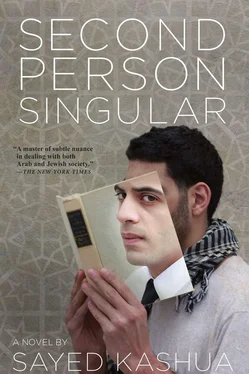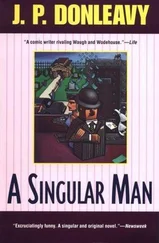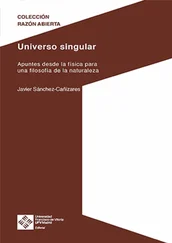Only then did I remember that I had heard something about the incident a few days earlier, either in the office or over the radio while on the bus, but I hadn’t really paid it any attention. In those days I didn’t follow the news, didn’t listen to the radio, and didn’t read the papers, aside from the old magazines that Majdi brought back from the hotel.
Leila said that one of the addicts came in one day and just started stabbing people. A secretary and a social worker were killed on the spot. One of the wounded was Leila’s previous supervisor. She couldn’t believe it when she heard the story. It was so awful, terrifying. Luckily it hadn’t happened on a day that she went into the office. After the incident, the social work department decided to repost her to a different bureau, to Walid, even though she didn’t want to work in the Arab sector — not because she had anything against her own kind, God forbid, but because of the budget constraints. “I wanted to do a real internship, not one of these half-baked ones,” she said. At any rate, she was happy they found her an alternative because there was no way she was going back to the southern district and she definitely didn’t want to waste a whole year.
At the clinic we pushed the intercom and waited for the director, who said he would be right down. “This place is nice,” Leila said. “What is it?” She looked over at the abandoned stone houses clustered at the foot of the hill.
“You never heard of Lifta?” Daud asked, getting more and more agitated, shifting his bag from hand to hand, waiting for the door to be opened. There were several addicts on the balcony, Styrofoam cups of coffee in their hands, sucking on their cigarettes. They had to be the veterans. The newcomers spent the first few days of rehab in their rooms, confined to their beds.
The director introduced himself to Daud and shook hands with everyone. I introduced him to Leila and he gave us a tour of the building, proudly showing her the office, the group therapy room, the inpatient rooms, the kitchen, and the dining area. He offered us coffee but we declined. I put a hand out to part with Daud but he pulled me in for a hug. Tears spilled out of his eyes. I told him again that I would come visit and that if he needed anything he should tell the social worker and that she would pass it on to me.
When I walked back into the office, Khalil called out, “Oh, just in time. I thought we were going to starve to death in here.” Leila came in behind me and the room fell silent. They knew she was coming. Walid had already been in and let them know. My colleagues were unusually polite. They stood, said hi, shook her hand, and looked her over. She smiled and repeated their names to make sure that she had gotten them right. Shadi, his confident gaze locking on her eyes, told her that Walid had gone down to city hall and that he would be back soon. “Sit here in the meantime,” he said, offering her his chair and moving over to Walid’s.
“Too bad for you,” Khalil said as he handed me the breakfast money. “If we would’ve gotten a male intern he would’ve switched you up with the food delivery.” Everyone laughed. “Allow me,” Shadi said to Leila, handing me an extra twenty shekels.
“When did you get so generous?” Khalil asked, looking over at Leila and smiling.
“No, thank you,” she said, smiling. “I’ve eaten already. But thank you very much.”
“Come on,” Shadi said, but when she didn’t change her mind he turned to me and said, “okay, so get me a pack of Marlboro Lights.”
When I got up to go, Leila jumped out of her chair and asked, “Can I come with you?”
PISTOLS
After a month with Yonatan, Osnat felt I could handle the day shift and she agreed to switch one of my nights for one of her days, either Friday or Saturday. More than two months had passed since I’d last seen my mother — the longest I’d ever been away from home — and since the Festival of the Sacrifice was coming up, during which the office was closed and my roommates would be returning to their villages, I decided that it would be the best time to go home.
Back when I was in grade school, I would spend the first two days of the holiday in Tira, with my grandmother from my father’s side. All the kids in Tira ran around during the holiday with toy guns and each year um-Bassem would hunt around Jaljulia and find me the best pistol money could buy. The guns um-Bassem got me were better than anything my uncles got for their kids and better even than the ones um-Bassem’s grandkids got from their parents. I don’t remember exactly when, maybe in kindergarten or first grade, but one year I went to um-Bassem’s house in my holiday clothes to get that year’s pistol and I heard Aunt Maryam ask her why she spent all that money on me. “It is written in the Koran,” um-Bassem answered. “The orphan must be honored.”
I liked being in Tira on the Festival of the Sacrifice because each year my uncles would roast a sheep, sometimes even a calf, in my grandmother’s yard. I liked it also because I got to play with my cousins, who had the same last name as me. In Jaljulia there was no one with my name. Usually there were around four people in every class with the same last name and I was the only one in my grade — and later, I learned, in the school and the entire village — with a strange last name. Sometimes I signed my homework and tests with a different name, usually um-Bassem’s. Her grandchildren called her Siti, Grandma, just like me, so why shouldn’t I have her name, too? But the teachers were never fooled, not even the new ones, and whenever it happened they told my mother and she sat me down and explained that um-Bassem was an honorary grandmother, not a real one. I knew that. I wasn’t an idiot. My notebooks and report cards carried my real last name, from Tira, but when the kids in school asked for my family name I gave them um-Bassem’s.
I was a stranger in school, a stranger in the village with a weird last name just like all the other strangers in Jaljulia. Everyone knew that the strangers came to the village because of a blood feud, and that the police had brought them there. That’s what they used to say then, but I didn’t really understand what it meant. I did know that something was wrong with the strangers, that their fathers were in jail, and that I shouldn’t hang out with them. Some of the strangers were called collaborators, and they were the most hated of all. There were never any of the collaborators’ children in my class, because I was in the A class and none of the children of the people that the police had brought to the village were in the A class. Our teachers would warn us about them and criticize the government for carting all of the country’s trash to Jaljulia. It’s true that I was also a stranger, but I was a different kind of stranger: a stranger in the A class, a stranger that the teachers liked, a stranger with good grades, a stranger with a mother who taught at the school. My mother told me that the police had not moved us to Jaljulia but that she had come in order to work in the school. I knew full well, though, that that was not true and that the police had brought us to Jaljulia just like the rest of the trash, just like the children of the blood feuds and the collaborators.
I remember that one time my father’s mother insisted that I remain in Tira after the holiday and not go back to my mother in Jaljulia. She yelled at my uncle that she would never speak to him again if he took me back. The holiday ended and I stayed in Tira. My cousins went to school and I stayed alone at home with Grandma. A few days later, my mother showed up at Grandma’s house in a police jeep. She got out of the backseat accompanied by two policemen. They were dressed in blue uniforms that looked like the costume um-Bassem got me in Mecca when she went for the haj . My mother was crying. She yanked my arm and then picked me up and ran back to the police jeep while my grandmother stood there and yelled, “You whore, you killed our son and now you’re taking his son. You whore, you should kill yourself. It would be better for you, you bitch.”
Читать дальше












